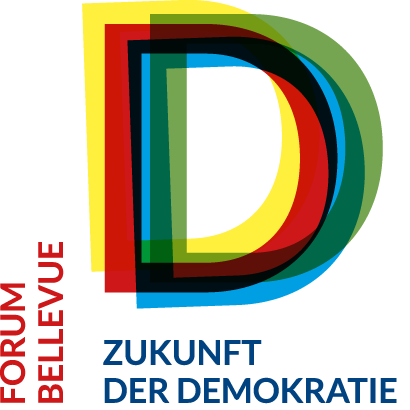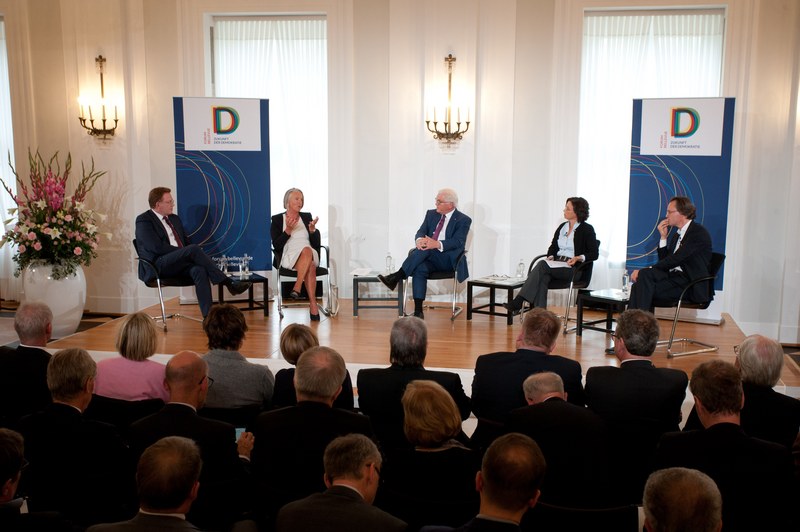"Rifts and Resentments. On the Fragmentation and Emotionalisation of Politics and Society"
4 October 2018
Politics is no different from all other areas of life. On the one hand, it is the product of rational decisions; on the other, it is shaped to a significant degree by emotions and sometimes even by "gut decisions." And yet, emotionalization and policies of permanent indignation can lead to resentments and even rifts within a society. At the fifth "Forum Bellevue on the Future of Democracy", Federal President Steinmeier joined with scholars and politicians to discuss how these social divisions can be overcome, and the role emotions play in politics.
"To keep a calm and cool head, not be aloof or restrained, but instead engage in a discussion founded in a deep conviction and passion for democracy." This is how Federal President Frank-Walter Steinmeier described one of the key challenges the participants at the fifth "Forum Bellevue on the Future of Democracy" were facing. Federal President Steinmeier had invited guests to join him in attempting to "decipher the resentments" that threaten our cohesion and peaceful coexistence. The title of the event was "Rifts and resentments" and was held only one day after the national holiday known as the "Day of German Unity." Therefore, the stage was set for an intense debate on a highly relevant subject.
Federal President Steinmeier's guests were Ute Frevert, director of the Max Planck Institute for Human Development, Cornelia Koppetsch, sociologist and professor of gender relations at TU Darmstadt, Andreas Hollstein, mayor of the German town of Altena, and Bernhard Pörksen, a media studies expert from the University of Tübingen. They discussed how politics and society can most effectively deal with anger and emotions while also overcoming ideological divides.
How can we deal with the communicative climate change?
The federal president kicked off the discussion with an appeal that was both a request and a warning: "Let us break the downward spiral of staged taboo violations and moral rebukes, and instead create a space for reflection." The federal president made it equally clear that the gathering should also not be taken as an opportunity to express undifferentiated lament for two hours: "Liberal democracy is something people yearn for all over the world. For me, this positive emotion, in particular, should be part of a discussion on feelings in politics. Indeed, I wish there were more democratic patriotism in this day and age!" Federal President Steinmeier then raised the question of how it would be possible to get people with different opinions back to the table in an era of "communicative climate change," which tends to cause emotions to heat up rather than cool down? And how can we inspire enthusiasm for democracy among people who are increasingly turning away from it?
Ute Frevert from the Max Planck Institute explained that emotions and politics have always gone hand in hand. She also advised caution with regard to any statement insisting that the brutal tone of the public debate we are currently experiencing has never been seen before. Frevert pointed to the words of Greek philosopher Aristotle, who argued that all forms of politics need emotions. She also noted that "the political mood was much hotter in the Weimar Republic than it is today."
That being said, however, Frevert argued that current debates are different since they are pursuing the goal of dividing people. She reminded the audience that even the environmental and peace movements had used the power of emotions to protest against nuclear power plants and military arms buildups: "Yet, in contrast to today, the goal was not to split society but to create a common responsibility," noted Frevert.
Do we need new visions for democracy?
"Still, how do fears of losing out and anger toward elites coincide with a stable economy and rule of law?" asked Federal President Steinmeier. Why are populists currently so successful, especially in wealthy European countries such as the Netherlands, Sweden or Denmark with advanced social systems? Cornelia Koppetsch provided one possible explanation by referring to a "rebellion of established citizens," arguing that these people are less driven by material losses than by fears of diminishing privileges, and that their perception of their own marginalization arises from actual social experiences. Koppetsch noted further that retreat, polarization, rage and a turning-away from tried and tested things are all a consequence of these social experiences, a secondary effect. Andreas Hollstein then appealed to everyone to stay open to dialogue and remain as understanding as possible. As the Mayor of Altena, a small town in Westphalia, Hollstein is often directly confronted with the emotions of his constituents, and in 2017 he was the victim of a knife attack by an angry citizen: "In small towns and villages, we feel the direct impact of the challenges associated with globalization," said Hollstein. "And this is where politics has to do its homework, because many people feel they've been left behind."
Media expert Bernhard Pörksen argued that we are going to need positive narratives if we want to increase enthusiasm for democracy and social responsibility. Pörksen saw one cause of the growing tendency to emotionalize social debates in a "new level of irritability" triggered by a too-close proximity of different camps in the realm of social media. "The more information available, the greater the potential for disinformation," noted Pörksen. He called for "new visions and an alternative narrative that consisted of more than just headlines and empty rhetoric," which he sees as the only way to successfully counter populist slogans.
The discussion participants were in agreement that the prerequisites for this new narrative are more or less already in place. "There are thousands of people in our country who work every day to ensure that life in the countryside, in villages and small towns, functions smoothly, and it is their voluntary commitment that makes it possible," said Federal President Steinmeier. He concluded with the appeal to acknowledge and appreciate this work: "These people are achieving more than we are aware of, and this is something we need to talk more about in our country."
The speech of the Federal President for the event can be downloaded here. (pdf).

